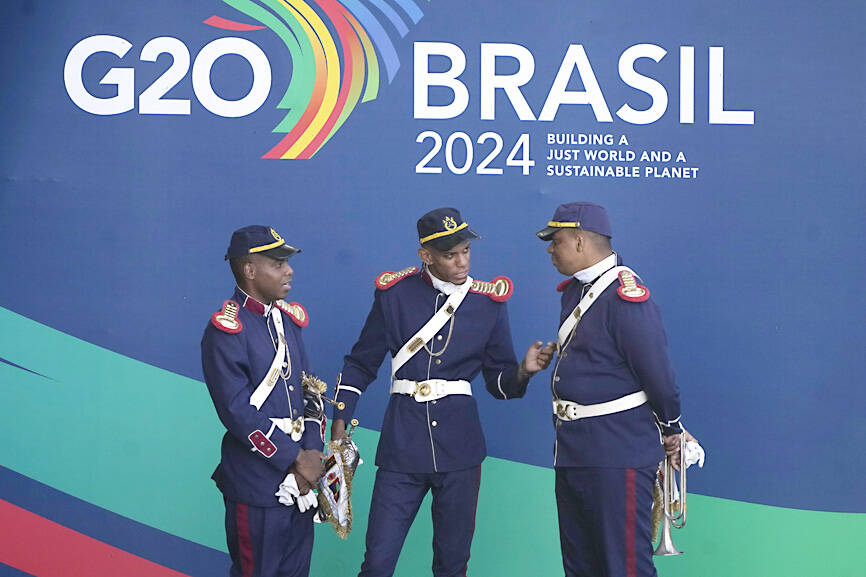G20 leaders gathered in Brazil yesterday to discuss fighting poverty, boosting climate financing and other multilateral initiatives that could yet be upended by US president-elect Donald Trump’s impending return to the White House.
US President Joe Biden is to attend his last summit of the world’s leading economies, but as a lame duck whom other leaders are already looking beyond.
The main star of the show is expected to be Chinese President Xi Jinping (習近平), who has cast himself as a global statesman and protector of free trade in the face of Trump’s “America first” agenda.

Photo: AP
Brazilian President Luiz Inacio Lula da Silva would be using his hosting duties to highlight his championing of Global South issues and the fight against climate change.
The summit venue is Rio de Janeiro’s stunning bayside museum of modern art.
Security is tight for the gathering, which comes days after a failed bomb attack on Brazil’s Supreme Court in Brasilia by a suspected far-right extremist, who killed himself in the process.
The summit would cap a farewell diplomatic tour by Biden which took him to Lima for a meeting of Asia-Pacific trading partners, and then to the Amazon in the first such visit for a sitting US president.
Biden, who has looked to burnish his legacy as time runs down on his presidency, has insisted his climate record would survive another Trump mandate.
The G20 meeting is happening at the same time as the COP29 climate conference in Azerbaijan, which has stalled on the issue of greater climate finance for developing countries.
All eyes have turned to Rio for a breakthrough.
UN Secretary-General Antonio Guterres has called for G20 members, who account for 80 percent of global emissions, to show “leadership and compromise” to facilitate a deal.
A Brazilian diplomatic source said fast-developing nations like China were refusing pressure by rich countries to join them in funding global climate projects, but added that he was hopeful of progress at the summit.

‘CORRECT IDENTIFICATION’: Beginning in May, Taiwanese married to Japanese can register their home country as Taiwan in their spouse’s family record, ‘Nikkei Asia’ said The government yesterday thanked Japan for revising rules that would allow Taiwanese nationals married to Japanese citizens to list their home country as “Taiwan” in the official family record database. At present, Taiwanese have to select “China.” Minister of Foreign Affairs Lin Chia-lung (林佳龍) said the new rule, set to be implemented in May, would now “correctly” identify Taiwanese in Japan and help protect their rights, the Ministry of Foreign Affairs said in a statement. The statement was released after Nikkei Asia reported the new policy earlier yesterday. The name and nationality of a non-Japanese person marrying a Japanese national is added to the

AT RISK: The council reiterated that people should seriously consider the necessity of visiting China, after Beijing passed 22 guidelines to punish ‘die-hard’ separatists The Mainland Affairs Council (MAC) has since Jan. 1 last year received 65 petitions regarding Taiwanese who were interrogated or detained in China, MAC Minister Chiu Chui-cheng (邱垂正) said yesterday. Fifty-two either went missing or had their personal freedoms restricted, with some put in criminal detention, while 13 were interrogated and temporarily detained, he said in a radio interview. On June 21 last year, China announced 22 guidelines to punish “die-hard Taiwanese independence separatists,” allowing Chinese courts to try people in absentia. The guidelines are uncivilized and inhumane, allowing Beijing to seize assets and issue the death penalty, with no regard for potential

‘UNITED FRONT’ FRONTS: Barring contact with Huaqiao and Jinan universities is needed to stop China targeting Taiwanese students, the education minister said Taiwan has blacklisted two Chinese universities from conducting academic exchange programs in the nation after reports that the institutes are arms of Beijing’s United Front Work Department, Minister of Education Cheng Ying-yao (鄭英耀) said in an exclusive interview with the Chinese-language Liberty Times (the Taipei Times’ sister paper) published yesterday. China’s Huaqiao University in Xiamen and Quanzhou, as well as Jinan University in Guangzhou, which have 600 and 1,500 Taiwanese on their rolls respectively, are under direct control of the Chinese government’s political warfare branch, Cheng said, citing reports by national security officials. A comprehensive ban on Taiwanese institutions collaborating or

STILL COMMITTED: The US opposes any forced change to the ‘status quo’ in the Strait, but also does not seek conflict, US Secretary of State Marco Rubio said US President Donald Trump’s administration released US$5.3 billion in previously frozen foreign aid, including US$870 million in security exemptions for programs in Taiwan, a list of exemptions reviewed by Reuters showed. Trump ordered a 90-day pause on foreign aid shortly after taking office on Jan. 20, halting funding for everything from programs that fight starvation and deadly diseases to providing shelters for millions of displaced people across the globe. US Secretary of State Marco Rubio, who has said that all foreign assistance must align with Trump’s “America First” priorities, issued waivers late last month on military aid to Israel and Egypt, the